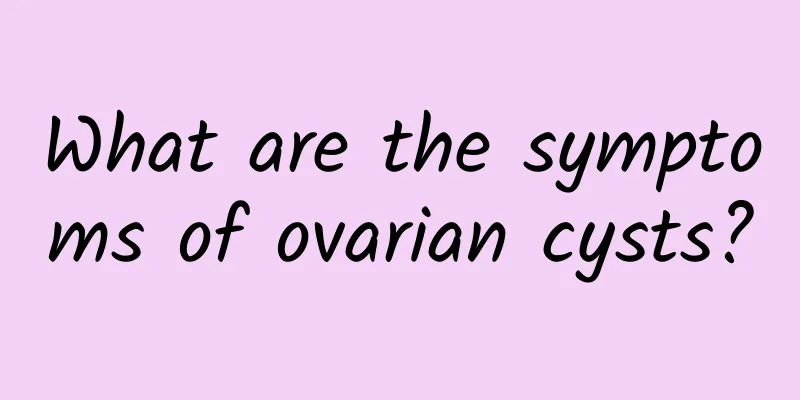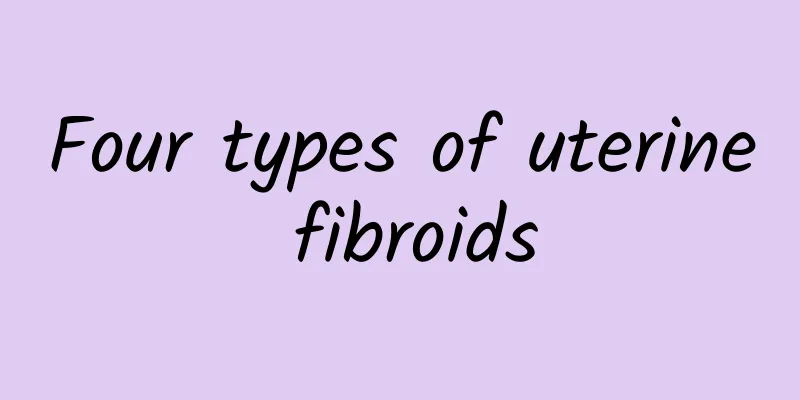What are the symptoms of ovarian cysts?

|
There are many symptoms of ovarian cysts, and women need to pay attention to the symptoms of this disease. Next, let the experts analyze and introduce to you what the symptoms of ovarian cysts are. I hope it can help you. 1. Abdominal pain If the tumor has no complications, there is very little pain. Therefore, if patients with ovarian tumors feel abdominal pain, especially if it occurs suddenly, it is mostly caused by the twisting of the tumor pedicle, or occasionally by tumor rupture, bleeding or infection. In addition, malignant cysts often cause abdominal pain and leg pain. The pain often causes patients to seek emergency treatment. This is the symptom of ovarian cysts. 2. Menstrual disorders Ovarian cysts, even bilateral ovarian cysts, usually do not cause menstrual disorders because they do not destroy all normal ovarian tissues. Some uterine bleeding is not endocrine, but may be caused by ovarian tumors that change the pelvic blood vessels, causing endometrial congestion; or by ovarian malignant tumors that directly metastasize to the endometrium. Menstrual disorders caused by endocrine tumors are often combined with other secretory effects. 3. Lower abdominal discomfort is the initial symptom before the patient feels a lower abdominal mass. Due to the weight of the tumor itself and the influence of intestinal peristalsis and body position changes, the tumor moves in the pelvic cavity, pulling on its pedicle and pelvic funnel ligament, causing the patient to feel distension and falling in the lower abdomen or iliac fossa, which is the symptom of ovarian cyst. 4. Symptoms of ovarian cysts are enlarged abdominal circumference and abdominal mass, which are the most common phenomena in the main complaint. Patients feel that their clothes or belts are too tight, and they just notice the enlargement of their abdomen, or they feel it by chance in the morning, so they press their abdomen and find that there is a mass in the abdomen, plus abdominal distension and discomfort. 5. Compression symptoms: Huge ovarian tumors can cause dyspnea and palpitations due to compression of the diaphragm. Ovarian tumors combined with a large amount of ascites can also cause such symptoms. However, the dyspnea of some ovarian tumor patients is caused by unilateral or bilateral pleural effusion; and it is often combined with ascites, forming the so-called Meigs syndrome, which is also a symptom of ovarian cysts. After reading the above brief introduction to the symptoms of ovarian cysts, I hope it will be helpful to everyone. Everyone should pay more attention to the symptoms of ovarian cysts, learn more about them, pay more attention to prevention in life, and treat them as soon as possible once they are discovered. |
<<: To avoid irregular menstruation, you should mainly do the following:
>>: Ovarian cyst examination for everyone to introduce
Recommend
What is uterine hemorrhage?
Uterine bleeding refers to abnormal uterine bleed...
How many days of pregnancy is better for abortion
There is no best time to have an abortion. Unders...
To improve the effect of aerobic exercise, just do these 2 steps before exercise!
Do you want to train your muscles and improve you...
What are the serious effects of left ovarian cyst on follicles?
Ovarian tumors are common tumors of the female re...
How to regulate menstruation
Missed periods are not uncommon among women, but ...
What are the symptoms of early pregnancy miscarriage and how to avoid it
What are the symptoms of early pregnancy miscarri...
What are the prevention methods for vaginitis?
The occurrence of vaginitis has brought unspeakab...
Can I eat brown sugar if I have adenomyosis?
Brown sugar has a certain warming and nourishing ...
Life details that patients with cervical erosion must pay attention to
During regular treatment, patients with cervical ...
What causes female cervical erosion? Female cervical erosion is caused by 4 reasons
It is a very common phenomenon for women to suffe...
Is the recurrence rate of cervical precancerous lesions high?
Is the recurrence rate of cervical precancerous l...
What are the causes of menopause?
Menopause is a common gynecological disease that ...
Mid-Autumn Festival turns into "swollen" autumn festival? Be careful of nutritional imbalance when eating barbecue and mooncakes. "Ginseng" can help you improve your protection!
The Mid-Autumn Festival holiday is here, and moon...
What should I do if there is excessive bleeding during the treatment of ectopic pregnancy?
What should I do if there is excessive bleeding d...
Introduce the symptoms of pelvic inflammatory disease
The symptoms of pelvic inflammatory disease are a...









